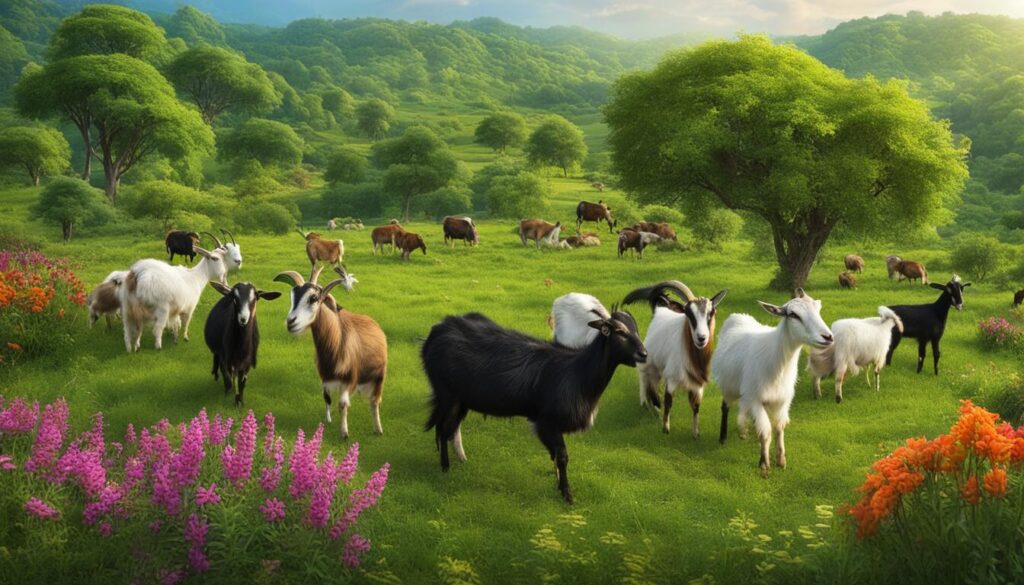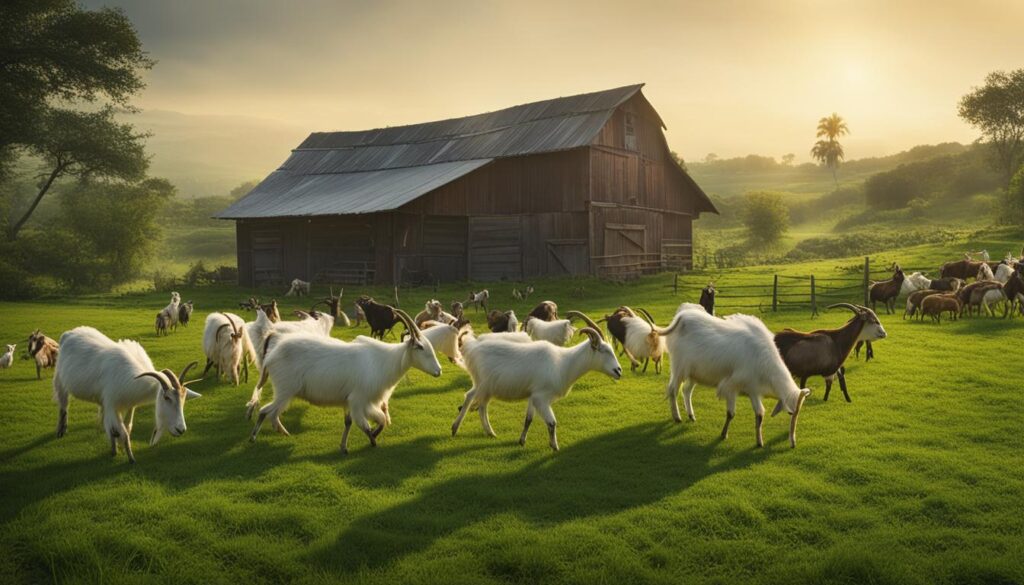As I walk the green pastures of my farm, the query that often mingles with the rustling leaves is about the effectiveness of goats in deterring snakes. There is a symphony orchestrated daily by a variety of farm animal interactions, but how much of this biotic ensemble contributes to snake management in agriculture? Through the lens of my experience, let us explore whether these bleating farm staples are more than just lawnmowers on hooves.
Every morning, as I step out to tend to my flock, I contemplate the roles each animal plays beyond their provision of milk or maintenance of turf. It’s a riddle wrapped in an enigma – do my goats unwittingly stand guard against slithering intruders, or is their presence merely coincidental to the comings and goings of serpents? I invite you to join me in unraveling this pastoral puzzle.
Key Takeaways
- Investigating the potential of goats in reducing snake populations on farms.
- Exploring biodynamic relationships, specifically goat and serpent behavior.
- Analyzing the traditional role of goats in farm ecosystems.
- Sharing personal observations of snakes in the presence of goats.
- Assessing the practical implications for backyard farmers and hobbyists.
The Rural Myth: Can Goats Actually Deter Snakes?
In the realms of agriculture and homesteading, common countryside beliefs often shape the way we interact with our surroundings. Among these, the notion that goats can serve as a natural deterrent to snakes is a topic of fascination and debate. As someone deeply entrenched in the farming community, I’ve heard many anecdotal stories about the supposed goat and snake relationship, leading many to wonder about the myth vs. reality in farming practices. Today, I delve into this rural legend to uncover the truth behind it.
While the idea might seem plausible on the surface—the constant movement of goats potentially warding off serpentine invaders—actual evidence that supports this belief is sparse. Agriculturists and hobby farmers alike have shared their experiences, but these accounts are frequently based on personal observations rather than scientific data.
Let’s consider the behavior of snakes. These reptiles, by nature, tend to avoid high-traffic areas and are more likely to be found in undisturbed patches of land. Logically, it’s conceivable that a herd of bustling goats could make an area less attractive to a snake looking for a quiet spot to reside. However, is the presence of goats enough to ensure a snake-free zone? The answer isn’t as straightforward as one might hope.
As someone who has been raising goats for over a decade, I am continually learning from their interaction with the world around them, including the local wildlife. The direct correlation between a goat’s presence and a reduction in snake encounters remains elusive without quantifiable evidence.
To further shed light on this topic, I’ve compiled a comparative chart featuring popular beliefs versus scientific findings:
| Common Belief | Anecdotal Evidence | Scientific Findings |
|---|---|---|
| Goats deter snakes through activity | Many farmers report fewer snake sightings in goat-populated areas | No conclusive research supports goats as effective snake repellents |
| Snake sightings decrease on goat farms | Some farmers claim that their lands are snake-free | Studies suggest snakes are more influenced by habitat than by livestock presence |
| Goat manure repels snakes | A few assert that areas with goat manure show reduced snake activity | Limited research on manure from specific animals affecting snake behavior |
In summary, while we can’t completely dismiss the testimonies of those who trust in the goat’s ability to repel snakes, it’s crucial to approach this belief with a healthy dose of skepticism. Until more definitive research is available, hobby farmers should consider a combination of methods for snake management, rather than relying on goats as a sole solution.
Understanding Goat Behavior and Its Impact on Snakes
As a hobby farmer, I’ve observed that the foraging behavior of goats and their impact on the ecosystem can be quite profound, especially concerning snake activity. Goats are known for their curious nature, and their movement across the landscape might be more influential in pest control than previously considered. Below, I delve into specific behaviors that explain how goats interact with their environment and potentially deter snakes from calling your farm home.

Goats’ Movement and Foraging Patterns
The typical day of a goat involves significant moving and grazing. This foraging behavior doesn’t just affect the vegetation; it also impacts the wildlife, including snakes, that inhabit the same area. Routine grazing means a lot of foot traffic, which can disrupt the natural habitat snakes require. Moreover, the consistent grazing tends to clear out tall grasses, reducing the cover snakes seek for hunting and protection.
How Hoofed Animals Can Discourage Snakes
One might not readily consider the impact of livestock on wildlife, especially concerning hoofed animals like goats. However, my goats’ frequent hoof activity across the farm appears to disrupt the serenity snakes crave. The ground vibrations and disturbances from hooves may make the environment less appealing for snakes, who prefer stable and unbothered ground for slithering and nesting.
Goat Habits That Might Affect Snake Presence on Farms
Understanding behavioral patterns of goats provides insight into natural pest control methods. Goats are inherently social creatures, choosing to move and feed in groups. This pack mentality and the noise that comes with it could be a factor in discouraging snakes from residing nearby. Additionally, goats’ curiosity has them exploring and poking their noses into various nooks and crannies, potentially rooting out snakes or making the area less secluded for them.
Analogous to natural pest control, these patterns and behaviors are critical to consider for holistic farm management. The relationship between goats and snakes may not be direct, but the indirect influence of goats on their surroundings suggests there may be more to their interaction than meets the eye in terms of deterring unwanted wildlife.
Comparing Traditional Snake Repellents to the Presence of Goats
As I delve deeper into farm management practices, it becomes increasingly apparent that the effectiveness of goats as a deterrent for snakes is a topic of much interest among fellow hobby farmers. Traditional snake repellents, often chemical in nature, have been a go-to solution for keeping these reptiles at bay. However, the introduction of goats into the ecosystem presents an intriguing alternative. The contrast between the two methods is not only essential in terms of their effectiveness but also their integration into sustainable farming practices.
When exploring alternative snake repellents, one can’t help but consider the ecological footprint left behind. Commercial repellents, although sometimes effective, often introduce toxins into the environment that can affect the soil and local wildlife negatively. On the other hand, goats offer a more environmentally friendly approach, contributing to the farm’s health through grazing and soil aeration—key elements in holistic farm management.
From my experience, integrating goats has not only enriched the land but also posed a conundrum for snakes, who seem to be put off by the constant activity and disturbance goats bring.
In my journey to provide practical advice, I’ve compiled real-life observations to compare these two methods of snake control comprehensively:

| Aspect | Goats as Repellents | Commercial Repellents |
|---|---|---|
| Environmental Impact | Positively impacts soil and biodiversity | Potential negative impact on soil and non-target species |
| Longevity | Continuous presence ensures ongoing deterrent | May require repeated applications |
| Cost-Efficiency | Costs are offset by the agricultural benefits of goats | Can become costly over time with repeat purchases |
| User Safety | Free from chemical exposure | Risk of chemical exposure to humans and pets |
| Integration in Farming Practices | Complements a holistic approach to farm management | Often requires additional management protocols |
Reflecting on the above points, it’s becoming clear that while commercial repellents have their place, the role of goats on a farm extends beyond mere vegetation control. They can be an effective element in a larger strategy of alternative snake repellents, fostering not just a safer environment for us humans, but a thriving habitat for a diverse range of species.
My Own Experiences with Goats and Snake Encounters
Embarking on a journey as a hobby farmer, I discovered the subtle nuances that contribute to the intricacies of farm wildlife relationships. Through my eyes, the daily operations of our backyard farm have served as a living laboratory for observing how goats may play a role in influencing the ecosystem, particularly concerning our slithering neighbors. It’s in these personal farming anecdotes where we can find whispers of wisdom and practical insight into the lives of our hoofed companions and their serpent counterparts.
Observations from My Backyard Farm
On my land, the interplay between goats and their environment proves endlessly fascinating. Over time, my goats have roamed and foraged, shaping the grounds they tread upon. A surprising byproduct of these routine activities was an apparent shift in the occurrence of real-life snake incidents. Whether it was the constant activity disrupting the quiet preferred by snakes or the alteration of the landscape by nibbling goats, the instances of coming across these reptiles dwindled. However, it’s this anecdotal evidence—one based on keen observation rather than controlled experimentation—that adds a meaningful piece to the farmer’s knowledge puzzle.
Unexpected Interactions Between Goats and Snakes
What hobby farmers may not anticipate are the unpredictable aspects of goat behavior. There were times when their natural curiosity seemingly invited closer encounters with snakes, defying my expectations. Even though goats are often perceived as fearless animals, on one occasion, I witnessed a cautious standoff that reminded me of the complex dynamics within farm wildlife ecosystems. These moments are invaluable, not just as interesting anecdotes, but as a testament to the goats’ influence on farm wildlife, serving as both active participants and accidental deterrents in our agricultural ballet.
